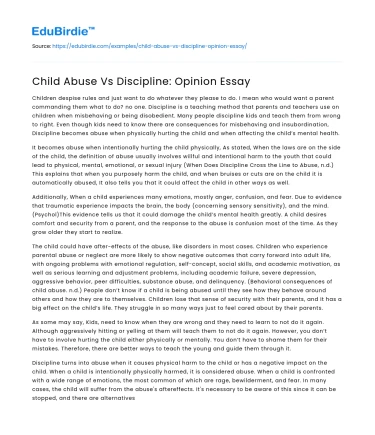Children despise rules and just want to do whatever they please to do. I mean who would want a parent commanding them what to do? no one. Discipline is a teaching method that parents and teachers use on children when misbehaving or being disobedient. Many people discipline kids and teach them from wrong to right. Even though kids need to know there are consequences for misbehaving and insubordination, Discipline becomes abuse when physically hurting the child and when affecting the child’s mental health.
It becomes abuse when intentionally hurting the child physically, As stated, When the laws are on the side of the child, the definition of abuse usually involves willful and intentional harm to the youth that could lead to physical, mental, emotional, or sexual injury (When Does Discipline Cross the Line to Abuse, n.d.) This explains that when you purposely harm the child, and when bruises or cuts are on the child it is automatically abused, It also tells you that it could affect the child in other ways as well.
Additionally, When a child experiences many emotions, mostly anger, confusion, and fear. Due to evidence that traumatic experience impacts the brain, the body (concerning sensory sensitivity), and the mind. (Psychol)This evidence tells us that it could damage the child’s mental health greatly. A child desires comfort and security from a parent, and the response to the abuse is confusion most of the time. As they grow older they start to realize.
The child could have after-effects of the abuse, like disorders in most cases. Children who experience parental abuse or neglect are more likely to show negative outcomes that carry forward into adult life, with ongoing problems with emotional regulation, self-concept, social skills, and academic motivation, as well as serious learning and adjustment problems, including academic failure, severe depression, aggressive behavior, peer difficulties, substance abuse, and delinquency. (Behavioral consequences of child abuse. n.d.) People don’t know if a child is being abused until they see how they behave around others and how they are to themselves. Children lose that sense of security with their parents, and It has a big effect on the child’s life. They struggle in so many ways just to feel cared about by their parents.
As some may say, Kids, need to know when they are wrong and they need to learn to not do it again. Although aggressively hitting or yelling at them will teach them to not do it again. However, you don’t have to involve hurting the child either physically or mentally. You don’t have to shame them for their mistakes. Therefore, there are better ways to teach the young and guide them through it.
Discipline turns into abuse when it causes physical harm to the child or has a negative impact on the child. When a child is intentionally physically harmed, it is considered abuse. When a child is confronted with a wide range of emotions, the most common of which are rage, bewilderment, and fear. In many cases, the child will suffer from the abuse's aftereffects. It's necessary to be aware of this since it can be stopped, and there are alternatives to violence.
Work Cited
- “When Does Discipline Cross the Line to Child Abuse ?” HG.Org, www.hg.org/legal-articles/when-does-discipline-cross-the-line-to-child-abuse-50043.
- HR.Org. www.hg.org/legal-articles/when-does-discipline-cross-the-line-to-child-abuse-50043.
- “Brain and Mind Integration: Childhood Sexual Abuse Survivors Experiencing Hyperbaric Oxygen Treatment and Psychotherapy Concurrently.” Leanna Bautista, www.frontiersin.org/articles/10.3389/fpsyg.2018.02535/full.






 Stuck on your essay?
Stuck on your essay?

